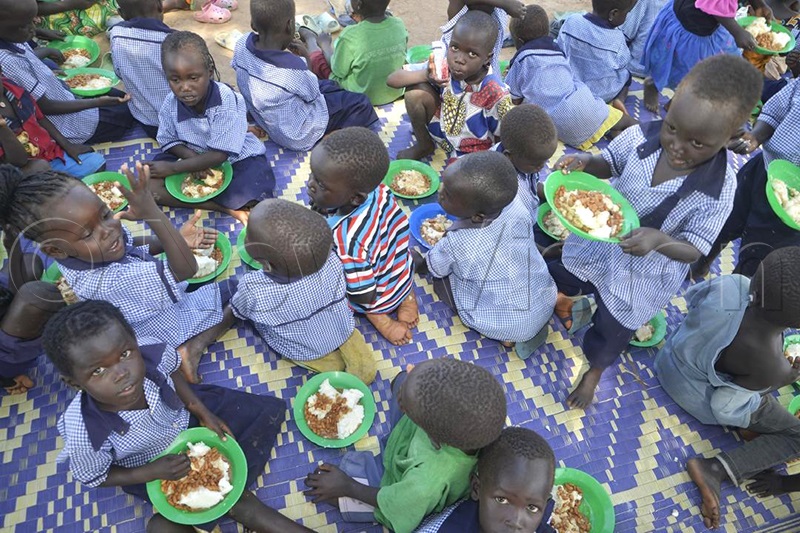Block farming project opens 478 acres of farmland for refugees in Bidibidi
The project implemented for both refugees and the host community in Bidibidi settlement, which provides the land, has seen a number of schools feed their children with the harvest from the gardens.
Learners of Alaba primary school in Bidibidi refugee settlement after having lunch. (Photo By Robert Ariaka)
_________________
YUMBE - As the world celebrates World Food Day 2025 under the theme “Hand in Hand for Better Foods and a Better Future,” the Action for Strengthening Partnership in Inclusion, Resilience, and Education (ASPIRE) continues to demonstrate its commitment to promoting food security, nutrition, and resilience among refugees and surrounding host communities.
Implemented by the Adventist Development and Relief Agency ADRA, as part of the World Food Day celebrated every October 16, 2025, Sam Businge, the ASPIRE Project Manager, says the project has mobilised and registered 81 farmer groups for block farming and vegetable production, reaching a total of 2,200 members.
This has opened 478 acres of farmland, planting crops like rice, cassava, and sorghum with a commitment to supporting these communities and promoting sustainable agriculture practices.
Pupils of Alaba primary school for meals during lunch. (Photo By Robert Ariaka)
The project implemented for both refugees and the host community in Bidibidi settlement, which provides the land, has seen a number of schools feed their children with the harvest from the gardens.
This has benefited 1,610 refugees and 590 nationals. The project has also distributed drought-resistant and high-yielding crop varieties, solar-powered irrigation systems, and training on climate-smart agriculture.
Nema Sadiya, South Sudan Refugee, says ADRA helped the farmers with Nerica 4 rice, which is very nice.
This is able to provide food for me at home, but also to feed the children. Sadiya is expecting a harvest of 20 bags, which she said will make life easier.
ADRA has introduced Value addition on all the produce by training the farmers on processing, branding and packaging, also geoprocessing machines to add value.
Despite the progress, challenges that have persisted include inadequate infrastructure and resources. Ashraf Abiriga, the Head Teacher of Alaba Primary School, says the high number of learners of 3,095 against only 23 teachers is not balanced.
He asked for more teachers and resources to improve the teacher-pupil ratio.
According to Abiriga, the ADRA Uganda's School Feeding Program has made a significant impact in the refugee settlements.
With over 8 acres of land opened for block farming and schools, this has helped the schools and communities plant crops like cassava, beans, and maize and softened learning for the children in the various schools.
The ASPIRE project continues to work hand in hand with communities, with its integrated approach to food production, value addition, and environmental sustainability, stands as a shining example of collaboration to create better foods and a better future for all.